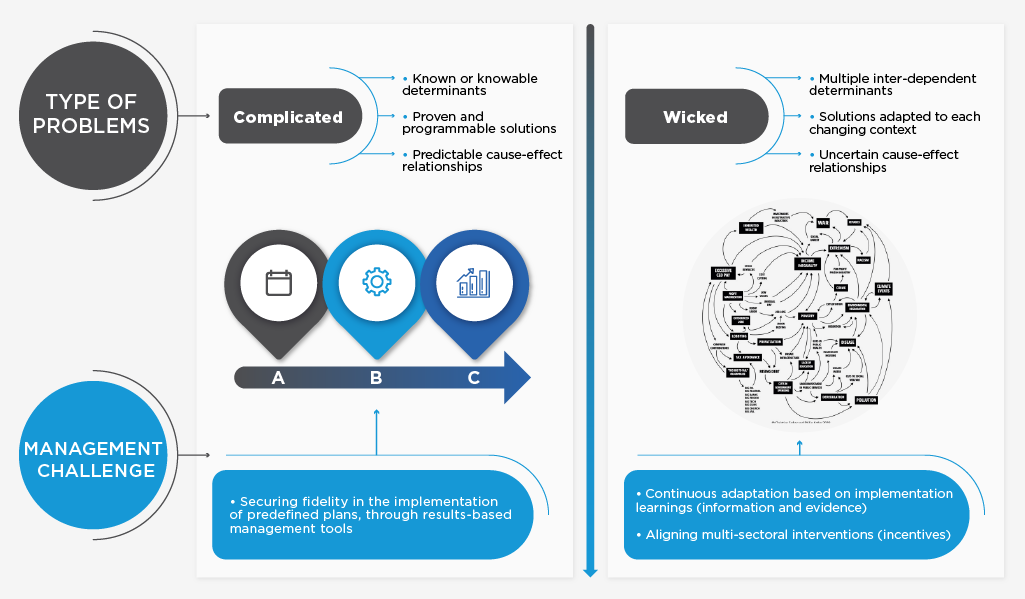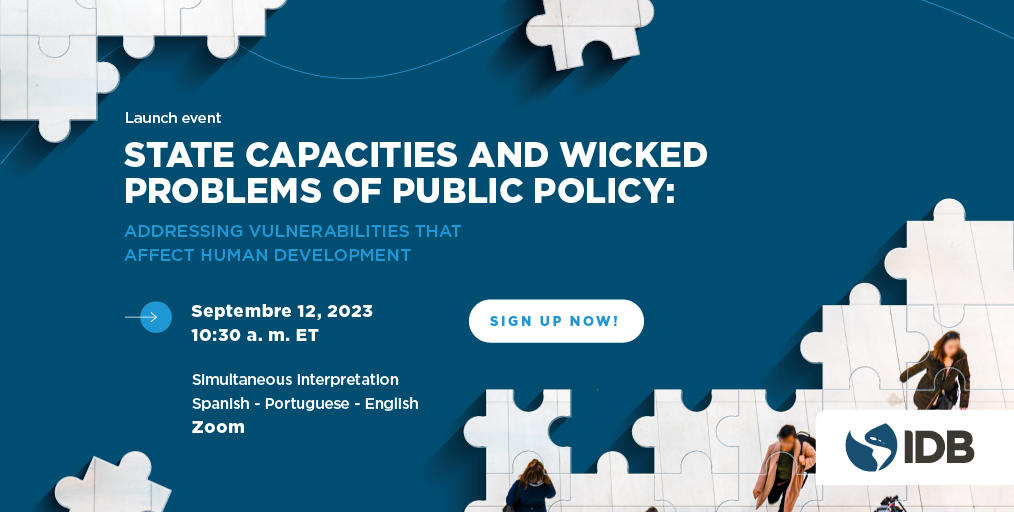Have you ever wondered why education or health policies are tipically led by a single ministry or agency, while climate change policies involve a large group of them? Nothing short of 14 ministries in Mexico and 25 federal agencies in the United States (including the top authorities in economic policy, energy, defense, urban development, agriculture, transportation, and employment, among other sectors) participate in climate policies.
The answer lies in the intricate nature of climate change, a complex or “wicked” problem. These wicked problems are multifaceted, and addressing them effectively requires the combined expertise and coordinated action of multiple actors. In this blog, we tell you what the wicked problems are and how the governments of the region need to adapt their organization and internal management to tackle them more effectively.
What are complex public policy problems?
Although addressing most public problems requires skills, experience, and specialized technical knowledge (that is, they are complicated), they often have known causes that can be dealt with through interventions whose effectiveness has been demonstrated by sufficient empirical evidence. Their biggest challenge is adapting these interventions to the contexts in which they will be implemented. Policies to reduce maternal and infant mortality, to improve school retention, or to increase labor formalization are some examples.
Instead, complex or wicked public problems are generated by an interlocking set of factors, known or not yet clearly determined, that influence each other and whose cause-effect relationships are contingent and difficult to forecast. Policies to address them usually present high levels of uncertainty, due to the difficulty in anticipating the various direct and indirect impacts of potential government interventions. In addition, such solutions require cross-sector technical knowledge. For all these reasons, implementing them requires distinctive policy, organizational, and public management arrangements.
How are complicated problems different from complex or wicked problems?
A few examples may clarify the distinction between complicated problems and complex or wicked problems. Building a subway line is complicated. It requires qualified human resources and systematic management tools. At the same time, there is already proven knowledge about the activities that need to be planned and executed to deliver it. On the other hand, managing urban mobility is complex: it is influenced by millions of continuous and rapidly changing interactions between the multiple actors that make up transit and therefore demands continuous adaptation to each specific context. In the same way, public policies for adaptation and mitigation of climate change, or to protect ecosystems such as the Amazon (through bioeconomy, sustainable management of agriculture, livestock, forests, and the fight against environmental crimes [EF1] [MA2] , among other actions), require coordinated multisectoral approaches and management, at all levels of government and even with the participation of non-state actors, many of whom have conflicting interests or perspectives.
What is the role of public administrations in the face of wicked problems?
Public administrations are poorly prepared to deal with complex problems of these characteristics. The organization in sectoral silos, by which mandates and resources (human and budgetary) are assigned exclusively and exhaustively to individual agencies, hinders the cross-cutting and collaborative work required to deal with multidimensional problems.
In Latin America and the Caribbean, these challenges are often aggravated by the existence of rigid and highly codified legal frameworks for public administration, which prioritize compliance with formal processes rather than the achievement of substantive goals that demand the cooperation of multiple units or teams.
This legalistic and procedural conception of public service does not facilitate the adaptive flexibility required to deal with wicked problems. Even results-based management tools are more effective for complicated than complex problems because they aim to ensure the reliable implementation of detailed execution plans, and, depending on how they are used, they do not necessarily enable much flexibility.

Climate change, “the wickedest problem of all”
Global leaders in public management, such as William Eggers and Donald F. Kettl, consider “climate change to be the wickedest problem of them all”. Climate is a physical system with multiple interdependencies and feedback loops, with tipping points that cause exponential, non-linear changes, and thus their local impacts are difficult to predict with accuracy.
Government interventions to tackle climate change require action and have variable impacts on multiple public agencies and economic sectors (energy, industry, agriculture, transportation, housing, urban planning, labor, etc.), which often have conflicting interests. Climate change also presents various areas of uncertainty, such as finding the most cost-effective ways to achieve carbon neutrality or predicting the occurrence of extreme weather events and their various impacts. All this implies great challenges for the usual arrangements of public management.
A recent IDB study offers solutions to improve the capacity to address complex problems such as climate change. These options are framed in two main pillars:
- Aligning the incentives of the multiple actors involved to facilitate integrated and synergistic policies. The organizational and management arrangements that the public sector should adopt to improve its capacities to design and implement coherent policies against climate change include: (i) strengthening the functions of priority setting, organization of the machinery of government, and coordination and monitoring from the Center of Government; (ii) adopting “systems approaches” in policy design, with robust theories of change and mapping the delivery chains that include the broad set of sectors involved and identify their interrelationships; and (iii) improving the tools for external accountability on the delivery of climate commitments, among other options.
- Expanding the information and evidence available to reduce uncertainty in decision-making and to facilitate learning about what works (and what doesn’t). In terms of public management, this involves: (i) the adoption of adaptive management tools and managerial and administrative flexibility for innovation, learning, and continuous adjustment; (ii) using the results of the monitoring of the interventions to feed said learning and continuous adaptation; (iii) ensuring the operation of open and integrated information systems that allow all stakeholders to act more effectively and jointly; and (iv) setting more robust standards of evidence for policy and regulatory approval, among other measures.
These reforms are part of the state capacity-building effort promoted by the IDB: one that seeks to learn from what we do and to do what we learn. This means addressing problems in an integrated manner, piloting innovative solutions, and iterating and adapting based on what has been learned from implementation and the changing circumstances.
This is the most promising way to tackle the complex problems that our public administrations face.
Do you dare to be part of the change? Join our webinar!
Join us on September 12th at 10:30 a.m. ET at the publication launch: “Capacities and Wicked Problems of Public Policy: Addressing Vulnerabilities that Affect Human Development”and discover how to approach wicked problems of public policy through tools that facilitate actor coordination, innovation, and continuous learning.



Nice blog – thank you. I guess William Eggers and Donald F. Kettl did not work in Fragile and Conflict affected states where they too need to tackle the impact of climate change. Fragility and conflict overlay another area of complexity and may require alternative means to tackle from what you describe. Moreover with climate change issues, one has to deal with prejudices and the fact that man (woman) is far from rational even when it comes to an existential crisis such as the impact of climate change. That is why the problem is so wicked.